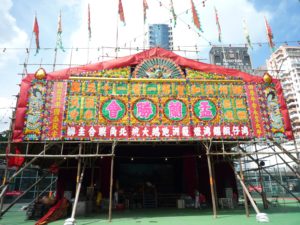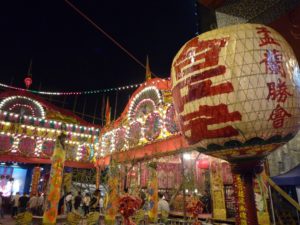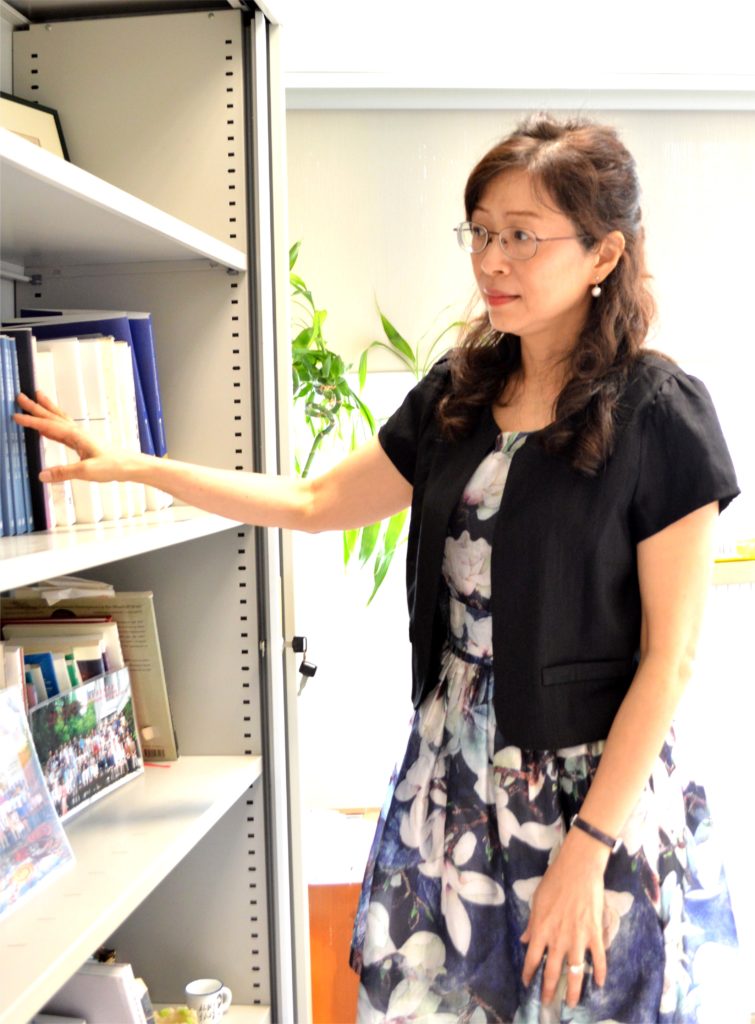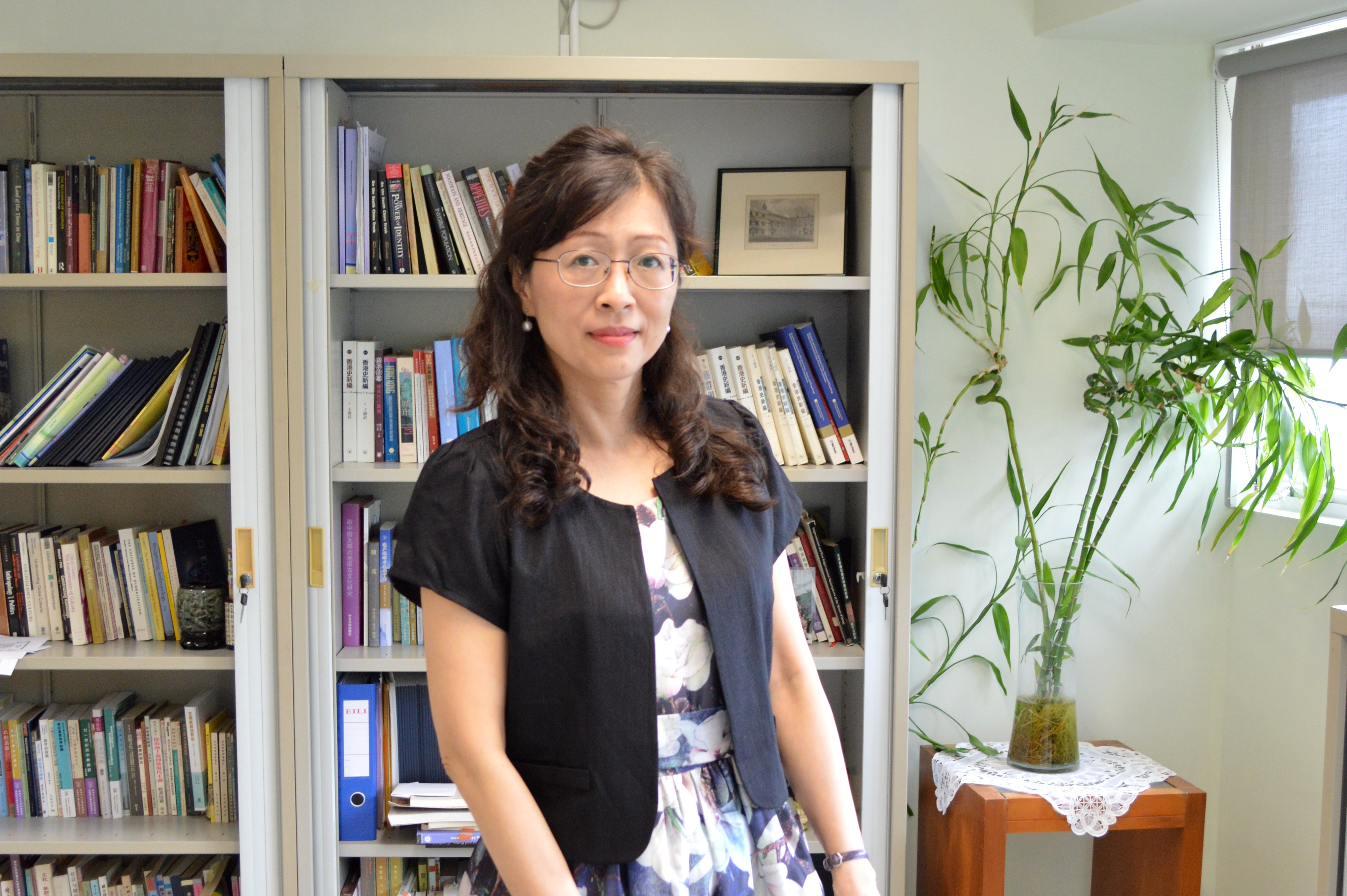The Research Office of Hong Kong Shue Yan University (HKSYU) will make more effort to promote the use of big data and digital technology to do research, to present research findings and to achieve knowledge transfer as the three laboratories on big data, AI and VR come into operation in this academic year, according to Professor CHAN Ching, Selina, Associate Academic Vice President (University Research).
In an interview with Shue Yan Newsletter, Professor CHAN says, in the past year, HKSYU received research donations of around HK$12.5 million, and the majority of the funding is from iFREE Group. The donation will help HKSYU to achieve the “Place” and “Programmes” elements of the University’s five year strategic plan, whereas “Place” stands for research infrastructure and “Programmes” stands for new degree programmes where technologies are at the core of the curricula.
The three new labs that come into operations in this academic year are the Big Data Lab, Social Robotics & Digital Living Lab and Virtual Reality Lab.
The University will offer two new undergraduate programmes in the upcoming 2021 and 2022 academic years, with technology being the core element of the curricula. They are the Bachelor of Arts (Hons) in Media Design and Immersive Technology (BA-MDIT) and the Bachelor of Science (Hons) in Applied Data Science (BSc-ADS).
“We will continue to improve our research infrastructure for reinventing the liberal arts education of HKSYU through developing and promoting research in digital humanities.” Professor CHAN said.
To carve a niche in digital humanities
Professor CHAN says the University will aim to promote the use of technology in research and tailor departments’ research and teaching activities to apply relevant technology and skill sets, as well as promote interdisciplinary research projects. Moreover, the University will encourage humanities and social sciences researchers to use digital technology and methods to present research findings, promote knowledge transfer, and generate social impact.
“Hopefully, digital humanities could become another niche of Shue Yan in ten years.” Professor CHAN said.
According to Professor CHAN, Dr. HUI Yew Foong of the Department of Sociology had done a digital humanities project early in 2011 and 2015 in Singapore. This project, “Project for the Documentation of Bukit Brown and She Ong Cemeteries”, emerged from the decision of the government to remove some graves in two cemeteries in order to build a new highway. The project was a multi-disciplinary one, using epigraphic studies, genealogy studies, ethnography, oral history, architectural history, media studies and visual sociology to record the pattern of location of the graves of different Chinese ethnic groups, the inscriptions and cultural features of graves and the memories associated with the cemetery. A website was set up to share information from the documentation work.
Professor CHAN says in order to make possible the collaboration across disciplines among Shue Yan scholars and to promote of the use of technology in research, the Research Office will set up “research clusters” to facilitate discussion and exploration. She believes that the “clusters” will also promote the use of digital methods to present research output and knowledge transfer.
Virtual Yulan museum
In fact, Professor CHAN is doing a digital humanities project by herself. The name of the project is “Three Celebrations of the Chaozhou Hungry Ghosts (Yulan) Festival: Research, Transmission, and Promotion”. One of the main output of the project is the establishment of a virtual Hungry Ghosts Festival museum. Upon its completion in the summer of 2022, it will likely be the first virtual intangible cultural heritage museum in Hong Kong.

The celebration of the Yulan Festival held by the Hong Kong’s Chiu Chow Community has been inscribed onto the national Representative List of the Intangible Cultural Heritage (ICH) of Humanity in 2011, and is also on Representative List of the ICH of Hong Kong.
The project received more than 1 million Hong Kong dollars under the Intangible Cultural Heritage Funding Scheme from the Intangible Cultural Heritage Office of the Leisure and Cultural Services Department.
According to Professor CHAN, besides studying and documenting the process of organizing the festival, site layout and use, contents of the religious ceremonies, performance of Chiu Chow operas, the techniques of bamboo shed theatre building and paper crafting, she will also analyse how Hong Kong’s collective memories and economic history are embedded in the festival. Finally, she will establish a virtual Yulan museum which displays her research findings and provides a virtual tour.

“A documentary and video clips of Yulan Festival will be put into the virtual museum website, as well as comic strip, animation, drawings, old photos and text. There will be virtual guided tour services of the Yulan Festival after you enter the museum where you can interact with the environment. You can stop whenever you like to explore and experience a ceremony or an artefact if you have interest, and a video clip, a comic strip or photos will come out.” Professor CHAN said.
She hopes the virtual museum and other digital output of the project will promote knowledge transfer. The project will enhance the understanding of national intangible cultural heritage, the relationship between the past and present, as well as the intriguing connection between Hong Kong and Mainland China. Through the analysis of this unique cultural tradition of the Chiu Chow people in Hong Kong, Hong Kong’s migration history, collective memories, and its complex identities will be delineated.
The societal benefits of academic research
In the interview, Professor CHAN also talks about the philosophy of academic research at HKSYU.
Professor CHAN says the philosophy of academic research at Shue Yan can be illustrated with the University’s motto, which reads “Cultivating virtues of benevolence; broadening horizon and knowledge”. “Cultivating virtues of benevolence” refers to the ideology of spreading kindness and tolerance, which materialises in Shue Yan’s number of research projects that benefit different sectors of society, such as the range of colleague led projects that focus on grassroots, disadvantaged and marginalised groups. The findings of these research projects help empower and improve the lives of those who are disadvantaged, as well as serve as references for the government in its policy making processes, which will help bring upon a society with harmony and a better, more equitable world.
She contends that, the University has achieved this goal to certain extent, take or instance, the Developing and Validating a Parent-Focused Intervention to Enhance the Executive Function Skills of Young Chinese Children from Low-Income Families Project, where Dr. CHAN Chi-keung, Alex from the Department of Counselling and Psychology held the title of Principle Investigator who published the The Key for Building Children’s Future: Cultivating the Executive Function Skills of Young Children manual to inspire parents from low income households on their parenting style following the completion of the project. Other examples include the People without identity: Exploring the social experiences of asylum seekers in Hong Kong Project, which was overseen by Dr. LAU Pui-yan, Flora from the Department of Sociology, and the research on teenage recreational drug use conducted by Prof. CHEUNG Yuet-wah, Head of the Department of Sociology and Dr. LI Hang. These are all projects that can offer invaluable insight to the government into its policymaking in the relevant areas.

Promoting interdisciplinary research
She explains that, “broadening horizon and knowledge” refers to taking a global and holistic perspective when developing research projects. In particular, the University encourages interdisciplinary research, participation in international academic conferences and publishing articles in International journals and books through academic publishers.
Professor CHAN says, “the University has conducted a considerable number of interdisciplinary and interuniversity research projects in recent years and it is my wish to see even more of them in the future, I believe colleagues from different disciplines and fields benefit from exchanges and discussions as the experience helps broaden the horizons of one another as well as inspire great chemistry for prospective projects. For instance, the history and cultural studies of Hong Kong may benefit from a more entertaining and engaging display through the strengths of the Department of Journalism and Communication, namely, media production with the introduction of technologies such as AR, VR and Big Data.”
Promoting research within department
Speaking of how to promote researches between colleagues, Professor CHAN explains that, on a personal level, academic researches entails determination and perseverance. On departmental level, an environment favourable to the inception of new research projects entails a culture and an atmosphere that invite colleagues to share preliminary ideas and altruistically help and encourage each other, which has been a reality in the Department of Counselling and Psychology. A departmental research committee was established in the 2018-2019 academic year, which I believe has been helpful in creating a favourable culture and facilitating coordination between colleagues.
She adds that, on the grander scale, the university has established the Centre of Interdisciplinary Research in Evidence-based Practice to facilitate interdisciplinary and evidence-based researches
She also takes on a proactive role to facilitate joint projects. “When I become aware of the similarities between the interests in researches of my colleagues from different disciplines, I would help coordinate and facilitate opportunities for exchanges, such as coffee meeting, Zoom meeting in order for them to share and discuss their ideas over a topic of common interest as well as explore the possibility of developing any new research projects.” Professor CHAN said.
The current university procedure for colleagues to apply to government departments or other organisations for research funding is that, the colleague would first submit the research proposal to the head of department. Upon receiving feedback from the head of department and amending the proposal, it would then be submitted to the University Research Office, to be reviewed by Professor CHAN, who would advise on the research topic and the proposal. External experts in the relevant field would also provide advice should the need arise. The application for funding is made only when the proposal has been finalised following the amendments. Professor CHAN believes that the procedure is effective in enhancing the quality of research projects and proposals, as well as the Chance of securing funding.
Getting undergraduate students involved
As to how undergraduate students may participate in researches, she points out that, the University encourages undergraduate students to learn and explore through researches and there are multiple ways they can become involved, these include completing conference papers under supervision and attending the relevant international conference while publishing the paper, or co-writing journal articles under supervision, which are to be published in academic journals. In addition, students may directly participate in their professors’ research projects, in tasks such as data collection.
Speaking of funding for researches, Professor CHAN says, not only does the University encourage colleagues to apply for grants from the University Grants Committee, it is also fully supportive of colleague’s applications for funding to government departments and other organisations, such as the Public Policy Research Funding Scheme as championed by the Policy Innovation and Coordination Office, the Innovation and Technology Fund, the Lord Wilson Heritage Trust and the Intangible Cultural Heritage Fund. The University also advocates research collaborations between its colleagues and the private sector or social enterprises. Not only is this category of projects beneficial to the transfer of knowledge, it is also beneficial to social enterprises and the public. Moreover, colleagues may also obtain grants for their research through external private bodies and funds.
“Shue Yan University is a teaching-led research-active university, and we believe that research and teaching complement one another, and therefore, all teaching members of staff are expected to teach in a research-informed manner. Furthermore, staff in professorial track are required to publish one refereed article every two years,” Professor CHAN explains.
Source: September 2020 Issue
Scan QR code with your phone

.
